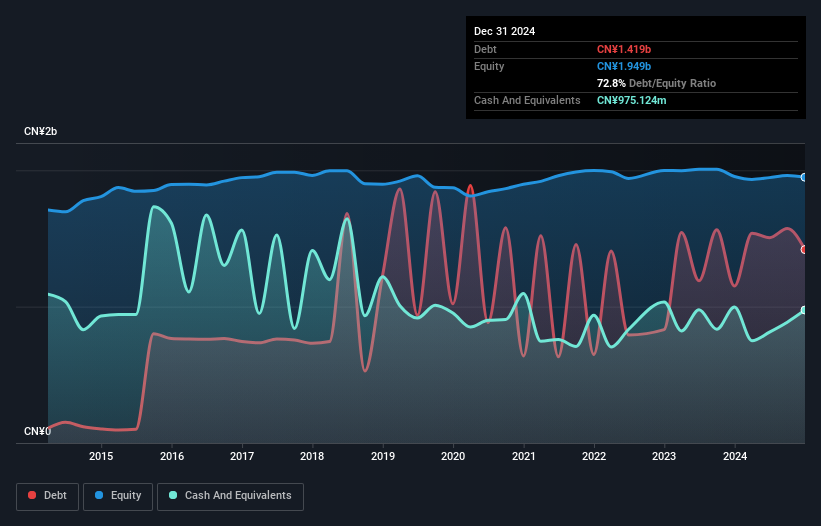- China
- /
- Specialty Stores
- /
- SHSE:600386
Beijing Bashi Media (SHSE:600386) Seems To Use Debt Quite Sensibly

Some say volatility, rather than debt, is the best way to think about risk as an investor, but Warren Buffett famously said that 'Volatility is far from synonymous with risk.' It's only natural to consider a company's balance sheet when you examine how risky it is, since debt is often involved when a business collapses. Importantly, Beijing Bashi Media Co., Ltd. (SHSE:600386) does carry debt. But the more important question is: how much risk is that debt creating?
When Is Debt A Problem?
Debt is a tool to help businesses grow, but if a business is incapable of paying off its lenders, then it exists at their mercy. If things get really bad, the lenders can take control of the business. However, a more frequent (but still costly) occurrence is where a company must issue shares at bargain-basement prices, permanently diluting shareholders, just to shore up its balance sheet. Having said that, the most common situation is where a company manages its debt reasonably well - and to its own advantage. When we examine debt levels, we first consider both cash and debt levels, together.
What Is Beijing Bashi Media's Debt?
As you can see below, at the end of December 2024, Beijing Bashi Media had CN¥1.42b of debt, up from CN¥1.15b a year ago. Click the image for more detail. However, it does have CN¥975.1m in cash offsetting this, leading to net debt of about CN¥443.4m.

A Look At Beijing Bashi Media's Liabilities
The latest balance sheet data shows that Beijing Bashi Media had liabilities of CN¥1.64b due within a year, and liabilities of CN¥1.02b falling due after that. On the other hand, it had cash of CN¥975.1m and CN¥316.1m worth of receivables due within a year. So its liabilities outweigh the sum of its cash and (near-term) receivables by CN¥1.36b.
Beijing Bashi Media has a market capitalization of CN¥3.64b, so it could very likely raise cash to ameliorate its balance sheet, if the need arose. But it's clear that we should definitely closely examine whether it can manage its debt without dilution.
View our latest analysis for Beijing Bashi Media
We use two main ratios to inform us about debt levels relative to earnings. The first is net debt divided by earnings before interest, tax, depreciation, and amortization (EBITDA), while the second is how many times its earnings before interest and tax (EBIT) covers its interest expense (or its interest cover, for short). This way, we consider both the absolute quantum of the debt, as well as the interest rates paid on it.
While Beijing Bashi Media's low debt to EBITDA ratio of 0.98 suggests only modest use of debt, the fact that EBIT only covered the interest expense by 5.5 times last year does give us pause. So we'd recommend keeping a close eye on the impact financing costs are having on the business. Importantly, Beijing Bashi Media grew its EBIT by 44% over the last twelve months, and that growth will make it easier to handle its debt. There's no doubt that we learn most about debt from the balance sheet. But it is Beijing Bashi Media's earnings that will influence how the balance sheet holds up in the future. So if you're keen to discover more about its earnings, it might be worth checking out this graph of its long term earnings trend.
Finally, while the tax-man may adore accounting profits, lenders only accept cold hard cash. So the logical step is to look at the proportion of that EBIT that is matched by actual free cash flow. Over the last three years, Beijing Bashi Media actually produced more free cash flow than EBIT. That sort of strong cash conversion gets us as excited as the crowd when the beat drops at a Daft Punk concert.
Our View
Beijing Bashi Media's conversion of EBIT to free cash flow suggests it can handle its debt as easily as Cristiano Ronaldo could score a goal against an under 14's goalkeeper. And that's just the beginning of the good news since its EBIT growth rate is also very heartening. Looking at the bigger picture, we think Beijing Bashi Media's use of debt seems quite reasonable and we're not concerned about it. While debt does bring risk, when used wisely it can also bring a higher return on equity. There's no doubt that we learn most about debt from the balance sheet. However, not all investment risk resides within the balance sheet - far from it. Be aware that Beijing Bashi Media is showing 2 warning signs in our investment analysis , and 1 of those is concerning...
At the end of the day, it's often better to focus on companies that are free from net debt. You can access our special list of such companies (all with a track record of profit growth). It's free.
Valuation is complex, but we're here to simplify it.
Discover if Beijing Bashi Media might be undervalued or overvalued with our detailed analysis, featuring fair value estimates, potential risks, dividends, insider trades, and its financial condition.
Access Free AnalysisHave feedback on this article? Concerned about the content? Get in touch with us directly. Alternatively, email editorial-team (at) simplywallst.com.
This article by Simply Wall St is general in nature. We provide commentary based on historical data and analyst forecasts only using an unbiased methodology and our articles are not intended to be financial advice. It does not constitute a recommendation to buy or sell any stock, and does not take account of your objectives, or your financial situation. We aim to bring you long-term focused analysis driven by fundamental data. Note that our analysis may not factor in the latest price-sensitive company announcements or qualitative material. Simply Wall St has no position in any stocks mentioned.
About SHSE:600386
Excellent balance sheet with acceptable track record.
Similar Companies
Market Insights
Community Narratives





